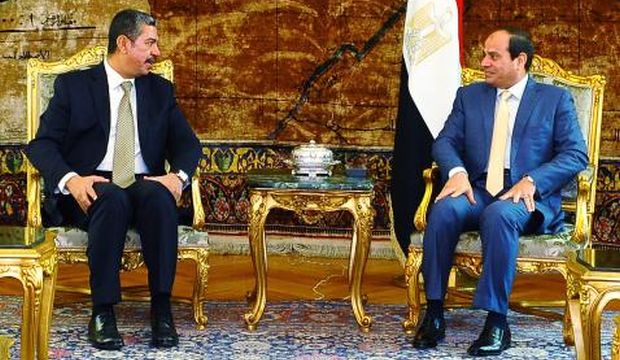
A handout picture made available by the Office of the Egyptian President shows Egyptian President Abdel-Fattah El-Sisi (R) sitting with Yemen’s Prime Minister Khaled Bahah (L), during their meeting in Cairo, Egypt, on July 12, 2015. (EPA/Office of the Egyptian President/HO)
Cairo, Asharq Al-Awsat—Egypt and Yemen’s internationally recognized government on Sunday signed a security agreement to cooperate on counterterrorism efforts, after a meeting between Egypt’s President Abdel-Fattah El-Sisi and Yemen’s Prime Minister and Vice President Khaled Bahah.
An Egyptian Foreign Ministry spokesman said after the meeting that the interior ministries of the two countries had signed a memorandum protocol “to cooperate in security matters . . . and coordinate counterterrorism efforts as well as target the sources of terrorism.”
During the meeting President Sisi said Egypt fully supports Yemen’s government and called on factions in the country to abide by UN Security Council resolutions on Yemen and seek a political solution for the crisis currently gripping the country.
He also stressed that all parties should abide by the outcomes of the Gulf Initiative agreed to by all Yemen’s political groups in 2013.
Agreements were also signed by Egypt’s Minister of International Cooperation Naglaa Al-Ahwani and her Yemeni counterpart Mohamed Abdul Wahid Al-Maytami for cooperation in a number of fields during 2015–2017 including higher education and media.
An informed Yemeni source told Asharq Al-Awsat the security agreement also comprised joint training of security cadres to combat terror activities in both countries.
The media agreements would also comprise joint training of media professionals, while those signed on higher education promised to increase the number of Yemeni students gaining scholarships in Egypt.
A number of previous healthcare protocols signed between both countries during 2005–2007 would also be reactivated.
This comes as the Saudi-led coalition which includes Egypt continues to target Houthi rebels in Yemen in an aerial campaign ongoing since late March.
The Houthis, backed by Iran and Yemen’s former ousted president Ali Abdullah Saleh, occupied the capital Sana’a last September and staged a coup in February, dissolving the cabinet and placing Bahah and President Abd Rabbuh Mansur Hadi under house arrest.
Hadi and Bahah eventually escaped to the southern port city of Aden and the president then headed to Riyadh where he requested Saudi Arabia and its Arab allies intervene in the country militarily in order to restore political legitimacy.
On Thursday the UN declared a ceasefire in the country beginning on Friday evening. However, eyewitnesses told Asharq Al-Awsat the ceasefire was broken by the Houthis almost immediately after it started, when the group’s militias shelled civilian areas in Aden and Taiz.
Yemen’s Foreign Minister Riyadh Yassin told Asharq Al-Awsat on Saturday the UN had not consulted with the Yemeni government before declaring the ceasefire. The government had set a number of conditions for accepting the truce, including the withdrawal of the Houthis from areas currently under their control and guarantees the group would cease all hostilities against civilians and stop blocking the delivery of humanitarian aid.
For its part, the Saudi-led coalition said on Friday it had not received any instructions from the Yemeni government to halt the airstrikes, which have continued to target Houthi positions since Friday.
The coalition had previously made an offer of a five-day humanitarian truce during May, but despite agreeing to the conditions of the ceasefire the Houthis continued to target civilian areas as soon as it began.
